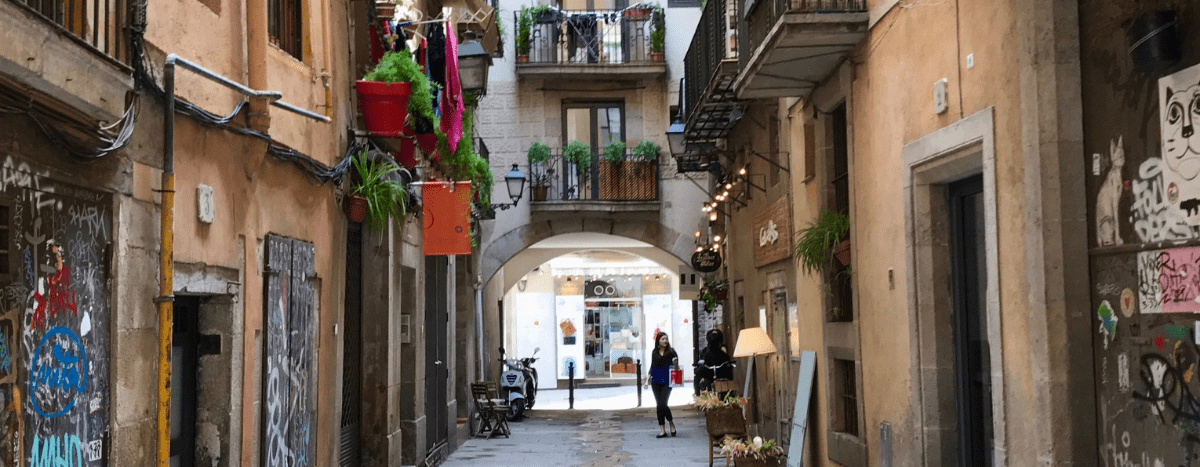
Maduro’s migrants: Venezuelans in Barcelona
Published on
These four women have one thing in common: they left their native Venezuela for Barcelona in search of a better life. A story of exodus, survival and finding belonging in a new place.
MAGALY
One of the things Magaly Mondragón misses the most about living in Venezuela is having space. Her house on a hill, her bonsai trees. “Caracas is beautiful, all green, with the mountain” she says, contrasting the city she fled from, with the densely populated Barcelona she fled to. In Barcelona, she pays €330 a month for a small bedroom on the ground floor of a hostel, a building that 55 year-old Magaly usually shares with backpackers less than half her age. The bathroom isn’t connected and on rainy nights she has to take an umbrella.
But what she doesn’t miss about Caracas is the hunger. “From January to June, 2017, when I was still in Venezuela, there came a point where I had nothing left to eat. It was as raw as it sounds,” she says. Finally, in June of that year, she left the country she had grown up in for good, leaving behind her girlfriend, who went back to her native Colombia, while Magaly headed for a new life in Spain.
In Caracas, Magaly—who was raised in a middle class family with Spanish Basque roots—had her own printing business and a pet store. Neither business managed to survive Venezuela’s mounting economic turmoil. “I had to close my printing shop and at some point I went hungry,” she says. “The inflation in Venezuela was so high that this cigarette lighter would cost you 200 bolivars today, and as much as 1000 bolivars tomorrow.” In 2018, the year after she left, the International Monetary Fund (IMF) calculated that inflation would exceed one million percent link text.
Because of her Spanish origins, Magaly had something most people in her country can only dream about: European citizenship. But even though it was better than Caracas, Barcelona was a tough dream. “I had a couple of close friends in Barcelona who had invested all their savings in their own bar. I washed dishes there for two years and lived under their roof, but the bar didn’t work out and there were six of us all living together,” Magaly recalls. After the bar failed, she got a job as a cook in a Venezuelan food truck. She moved out of her friends’ home and into a three bedroom flat occupied by ten other people.
“I quickly got so desperate that I had to leave,” she says, even though leaving meant stepping into an even more precarious situation. “The feeling of sitting in a café and not knowing where you’re going to spend the night, well, it has really changed me.” Four months ago, she found a more stable job: cooking Arepas for Glovo, a food delivery service.
A few weeks ago Magaly wasn’t sure she’d get her salary in March, so she decided to move back to Venezuela. “I make 900 hundred euros a month, and with that I’d be able to live in Venezuela for about nine months. Food is scarce and you literally cannot afford to get sick, but I can’t stay jobless in Barcelona either. I’ve cleaned big ships, I’ve looked after elders, I’ve worked in a call center, I’ve been a cleaning lady. I’m too tired to keep on looking for temporary jobs”. Magaly thinks she is suffering from depression. But she has a good feeling about the Catalans: “They’ve treated me right; I think they are welcoming”.
She also misses her Colombian girlfriend who returned back to Colombia while she herself moved to Barcelona.
JENNIFER
Jennifer was the last of her family to leave Venezuela. She came to Barcelona eleven years ago, when she was in her late twenties and when Venezuela was full on in the throes of Chavismo, but had not yet descended into the hunger, poverty, breakdown, and chaos that reigns today.
“I used to work as an editor for a private newspaper called the Daily Journal which doesn't exist anymore, and at some point my boss started to warn me,” she told me. “There was no room to publish anything critical of the government. Eventually, Maduro’s government bought the paper, and soon afterwards it had to close down.”
After the paper stopped printing, she went to work for a Canadian mining company, until that had to close down too. Jennifer lost three jobs as a consequence of the Venezuelan government’s economic policies, but what ultimately triggered her decision to leave the country was the constant feeling of being unsafe. Except for the secondhand car that she was eventually forced to sell, she didn’t own any property. And yet, shortly before coming to Spain, she was robbed at gunpoint while driving home. Not once, but three different times.
When she decided to emigrate, Jennifer didn’t have any legal right to live and work in Spain (or anywhere else in the European Union), so she applied to one Master’s program after the other as a way in order to keep her student visa. After completing five Master’s degrees in a row, she finally got a residency permit, which has to be renewed every two years.
“The first five years I worked very long hours at different jobs, traveling from one side of the city to the other, while studying at the same time.” It’s been two years since she applied for Spanish citizenship, but she is still waiting. Eventually, her plan is to bring her widowed mother to Spain too; in Barcelona, she would find a burgeoning community of Venezuelans, including Jennifer’s partner, to support her transition.
“I think Chávez had good intentions at first. He planned to spend more on education, give the poor proper housing and so on; but everyone knew where he came from: he was a soldier who had tried a failed coup d’état three years before winning the elections. It’s sad. I’m not a fan of Trump, but I’m waiting for someone to enter Venezuela and solve the problem. The transition will be long: I won’t get to see a peacefully recovered Venezuela in my lifetime, because the country has to start from scratch.”
SUYIN
Suyin Medina is in her late forties. She’s a friend of Magaly Mondragón, who arrived in Barcelona in the summer of 2017 without European papers. Like Jennifer, she decided to study to obtain her residence permit and, if possible, Spanish nationality. We meet in the apartment she shares with her Catalan wife. Crime, economic inflation and poor access to food and other basic supplies drove Suyin out of her native country. She no longer wanted to live in a country where someone might shoot you for a pair of shoes. According to Suyin, Maduro’s government offered poor children weapons and motorbikes they’re now willing to use far beyond Maduro’s goal. They are the so-called colectivos. “We never were a Narco country, in spite of being so close to Colombia, but this is taking a turn for the worse now”.
Suyin used to have her own business, but inflation made it almost impossible for her to keep it open: what she bought in the morning might cost half of what she had paid for it in the evening.
“We weren’t used to this type of economy,” she says members of different colectivos tried to kidnap her three times before she decided to move to Spain. “-I had a small business but with a constant flow of money that really attracted the colectivos: once they tried to do it while I was driving home, and they did again in front of my home; luckily, a neighbor assisted me”. She has always worked for transnational companies like Danaven and Clariant in Venezuela, where she used to have some properties, but she decided to sell everything she had and to change the course of her professional career. While still in Venezuela, she applied and paid for a postgraduate course on catering industry. She has learnt cooking skills and has managed to get a paid internship; so far she has invested 7000 euros in her education, and she keeps on studying even though her marriage contract with a local woman already grants her the right to live legally in Spain. “_Fortunately I met a great woman and we’re very much in love”.
“Something that shocked me is that people here earn about 1000 euros, which is really not enough if you have to pay a rent and everything. I expected to arrive here and start making about 3000 euros a month, but that’s not the case. In Barcelona people can buy whatever they want, they just don’t have money to do so.” Like Magaly Mondragón, Suyin is grateful for the way Catalans treated her. At first she went to the Canary Islands and then she went to Madrid, but the Spanish capital was too big for her and so she decided to move somewhere in-between: “_Barcelona was for me: it’s big but not too big, and there’s the sea, like back in my country; besides, the idea of learning a new language like Catalan attracted me. Still, if it weren’t for Maduro we would have never left our paradise”_.
MARISELA
Marisela, aged 62, came to Spain in September 2018 as an asylum seeker. By December that same year she’d been accepted in a refugee program that keep her busy: she has to assist integration talks and courses, and she also spends time with other international refugees. She now lives in Murcia, in the southeast of Spain. In 2017 Marisela spent three months as a tourist in Spain. She stayed at a Venezuelan friend’s house, in Cartagena. In the meantime, the situation in Venezuela worsened. She was depressed for the lack of basic food and the insecurity, so she sold all she could sell, closed her two houses (one by the beach, the other in town) and put all of her belongings in two suitcases. She was scared to start a new life, but the NGO has helped her deal with the situation by offering her a place to stay, daily food and guidance. Unlike other Venezuelan migrants and refugees, she doesn’t have European papers: “I’m Venezuelan, Venezuelan”, she says over the phone.
In Spain not all refugees are the same. Those who have a place to stay are offered a red card that allows them to work in Spain. The red card Marisela has will let her stay for two more years and during this period of time the Spanish government will decide whether she can become a Spanish citizen or not. “-Coming as a refugee is not like coming as a tourist, even though my situation is not as bad. I know some Venezuelans who don’t know where to spend the night or what to eat. I’m grateful to Spain, but at the same time I wish I were with my family, because I feel I’m not free to go back home”. She claims she never trusted Maduro. “-At first he seemed to somehow empower part of the population, but his management has been more than awful”.
Marisela likes Murcia. She shares a flat with other refugees from that same NGO who helped her: a Colombian-Venezuelan woman, a Ukrainian woman, a Croat, a man from Tunis and a few Moroccan people. “Each of us has a different situation and none is similar, not even between us Venezuelans. There’s a common factor, but the reasons of our asylum are diverse. In a way it is enlightening”.




